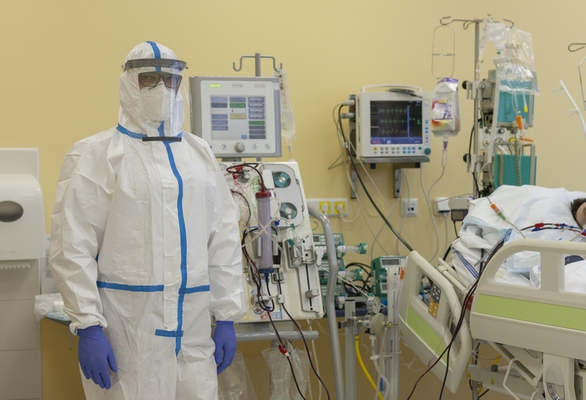
The rapid increase of older people means there will be an urgent need for critical care providers, such as adult-gerontology acute care nurse practitioners. (AGACNPs), who work with elderly patients, which range from young adults to frail seniors that have multiple complicated diseases. AGACNPs are usually seen in emergency rooms, inpatient hospitals, and ICUs, dealing especially with severe ailments that frequently are life-threatening.
The function of the acute care nurse practitioner (ACNP) was designed from the late 1990s to meet the requirements of a growing aging population in addition to the human resource deficit that had grown in critical care medicine. The adult-gerontology (AG) ACNP acknowledges and integrates the energetic nature of every individual's reaction to severe, critical, or complicated chronic illnesses or harm from the supply of maintenance. The ACNP eases transitions of care throughout the health care continuum. This chapter gives a thorough guide to clinical simulation situations such as AG ACNP.
What Does an AGACNP Do?
Due to the aging of the huge baby boomer generation, acute-gerontology nurse professionals are in high demand, especially since they can operate in a massive collection of specialty areas, such as nephrology, cardiology, neurology, and operation. AGACNPs usually operate in trauma components, sub-acute care units, emergency rooms, and intensive care units in which they carefully collaborate with doctors and specialists.
By doing this type of work, AGACNPs has to understand the health conditions that develop with aging.
A newspaper in the Online Journal on Problems in Nursing points out that"the rising disparity between the quantities of critical care suppliers to the numbers of patients has precipitated the higher requirement for adult-gerontology acute care nurse practitioners in critical care arenas. The enlarging complexities of this seriously ill patient population affirm the evolution of a critical-care concentrated, interprofessional critical care residency"
The healthcare provider community, and notably AGACNPs, should develop a heightened awareness and sensitivity to the varied and special needs of the aging market.
Helping patients maximize hearing and vision may diminish feelings of isolation, depression, and cognitive impairment. Elderly patients also take advantage of resistance training which fosters lower extremity strength which will enable basic daily tasks, like walking and bathing. Patients over 85 additionally require those muscles to stay secure and avoid falls.
On the other hand, the reduction and reduction of immune functions, hearing, eyesight, and muscle are a part of the normal aging process, based on"Age-Related Diseases and Clinical and Public Health Implications for its 85 Years Old and Over Population," printed in Frontiers of Public Health. The newspaper points out several syndromes and modifications in this large senior people that will require infrastructure and policy changes, such as a greater focus on caregiver service, services in the House, and assistive technology:
As you might already understand, nurse practitioners serve as significant primary healthcare providers for several patients across the USA. One of the respective specialties nurse professionals may have, grownup gerontology main care is one which could increase in significance because the average age of the US population continues to rise. Nowadays, we examine the services and care mature gerontology primary care nurse practitioners provide patients.

Obligations
AGPCNPs give acute, chronic, and preventative healthcare providers, coordinating with specialty doctors and other health care providers as required.
In addition to diagnosing, analyzing, and treating their patients, Mature Gerontology Primary Care Nurse Practitioners normally provide regular checkups, evaluations, immunizations, and one-on-one wellness counseling and education. In reality, providing education is a huge portion of daily life and these nurse professionals work closely with their patients to develop and implement wholesome lifestyle and disease prevention programs. Frequently involving things like exercise, diet, and physical therapy as well as any prescribed drugs. AGPCNPs will also use a patient's household to be certain family members are involved and educated as required to encourage the individual.

Places of Practice
AGPCNP can also work in a Selection of organizations such as:
Long-term care and assisted living centers
Healthcare practices
Hospitals
Rehabilitation facilities
Nursing houses
Correctional centers and other configurations with primary care providers
Instruction
To practice, each nurse practitioner must complete a master's degree program, with many bringing in extra post-graduate certifications and even doctoral levels. Throughout their profession, nurse professionals continue to raise and maintain their understanding of healthcare by finishing regular continuing education classes and workshops.
AGACNP Curriculum
Pupils start with an orientation, and then advancement to many clinical encounters. The AGACNP track prepares students to become qualified for certification as an adult-gerontology acute care nurse practitioner. The classes from the AGACNP concentration concentrate on these opportunities:
Know-How to Give patient care for your adult inhabitants
Study household evaluation, intervention, and also the management of common adult health issues
Develop innovative clinical diagnostic and decision-making abilities to enhance the quality of healthcare for adults and people in underserved populations
Further, analyze the role of acute-care nurse professionals and their Effect on improving wellbeing services
Concerning the Ohio University Online Master of Science in Nursing Program
The online MSN program at Ohio University is intended for practicing RNs who wish to advance their experience in the nursing area. Pupils in the Mature Gerontology Acute Care Nurse Practitioner concentration accept classes like primary care of adults and the direction of most common adult health issues.
As the demands of acutely ill patients at hospitals increase while lengths of medical and stay resident hours decrease, altering hospital employment trends have increased the need for acute care physicians. Our Adult-Gerontology Acute Care Nurse Practitioner program will prepare you to excel as an acute care nursing pioneer in many complicated scenarios and surroundings. Experienced U-M School of Nursing school currently working as nurse leaders within this field will prepare one to direct patients and direct peers through complicated health issues, such as chronic and acute illness.
Spend a couple of minutes to hear straight from the U-M School of Nursing faculty member that directs our Adult-Gerontology Acute Care Nurse Practitioner program. It can help you better understand the factors to consider as you determine if this innovative practice specialization program is ideal for you.
Is acute care for me? What type of clinical encounters will I have in this system? Get answers to those essential questions and obtain firsthand insight from a current learner to better understand how this innovative practice specialty application can help you become a leader in this dynamic area.
A strong emphasis is placed on complex assessment, diagnostic reasoning and decision making, therapeutic interventions, and referral and consultation skills throughout your clinical practice. You are going to spend your first duration in this program from the classroom preparing for clinical practice.

Leave Comment Below
0 Comment(s)